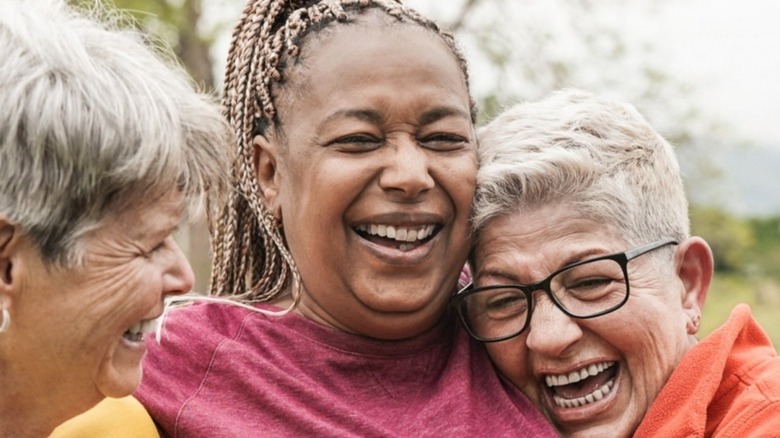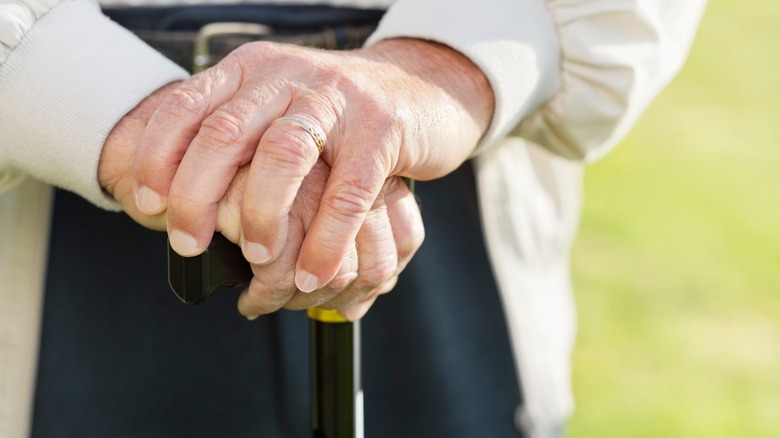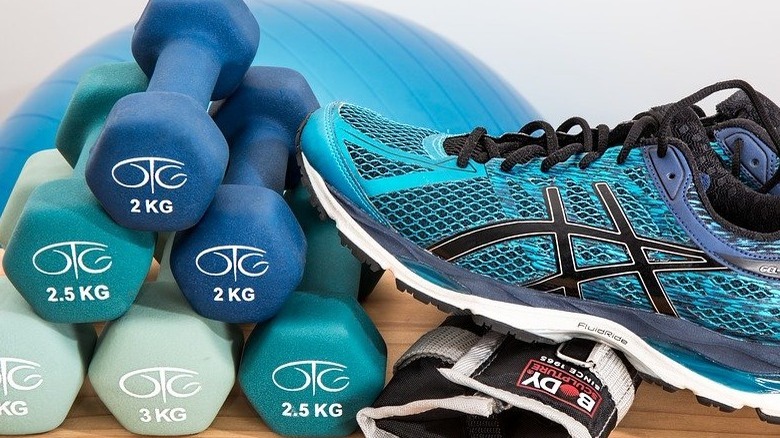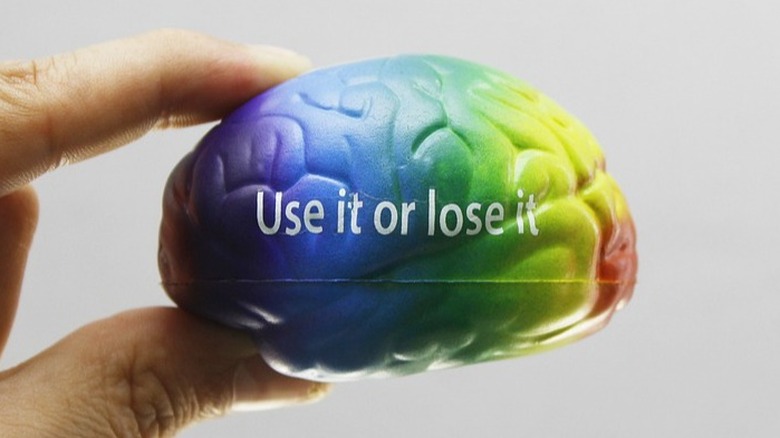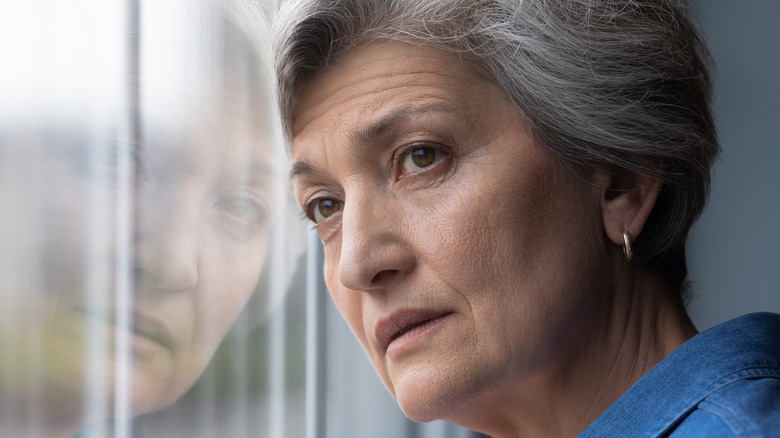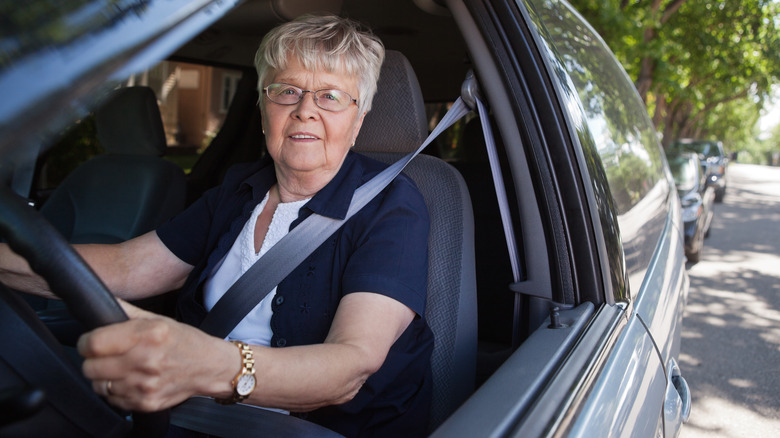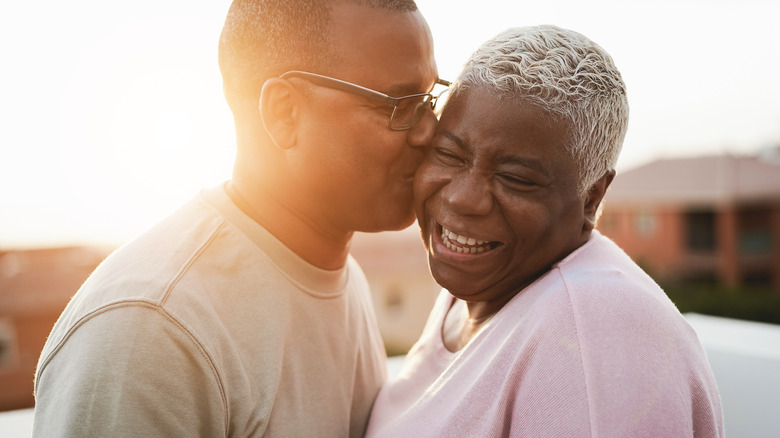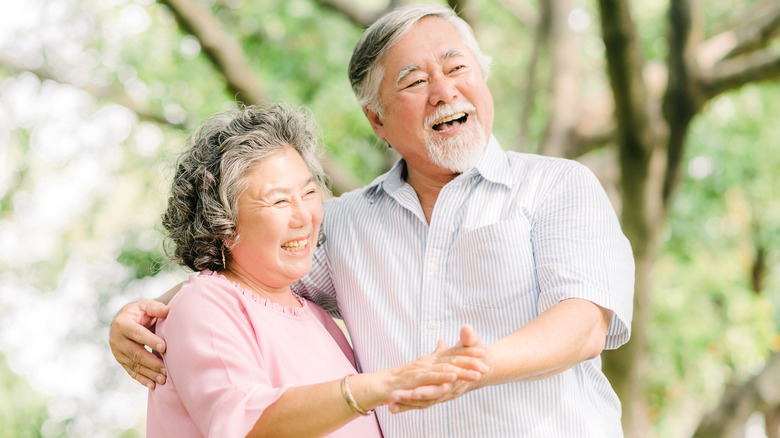Myths About Aging You Should Stop Believing
We may receive a commission on purchases made from links.
What comes to mind when you think of getting older? Negative images and stereotypes about aging are so prevalent in our culture that you may find it hard to be optimistic. In reality, this sort of ageism can act as a self-fulfilling prophecy, setting us up for failure. A 2020 study published in Psychology and Aging suggests
"stereotype threat" can impair the performance of basic physical tasks in older adults. Additionally, a study in the journal Aging and Mental Health found the experience of ageism to be correlated with negative health outcomes.
Thankfully, we can turn this around. A separate study from Psychological Science found subliminal positive messages about aging could lead to improved physical function in seniors. Furthermore, these positive effects continued after the intervention ended. In other words, when older adults hold themselves in high esteem, they tend to be less affected by problems commonly associated with old age. This suggests that our mindsets can play a crucial role in framing our experience of aging.
Unfortunately, negative myths about aging abound — so it's not surprising many people have a negative outlook about getting older. With all this in mind, let's bust some popular myths about aging once and for all.
Myth: Nothing can be done about physical deterioration
As you get older, your muscles and tissues will experience more wear and tear. However, this does not necessarily mean there's nothing you can do! As a booklet from the World Health Organization explains, much of the physical decline people face as they get older "can largely result from people expecting to decline." Instead of just writing weakness off as a byproduct of aging and avoiding exercise, try to get more exercise.
"Regular activity can positively impact our physical health as well as our mental and emotional wellbeing," the National Council on Aging explained. "It can help give us more energy and greater self-confidence, enabling us to embrace our later years with gusto."
Exercise is useful in combatting muscle deterioration (via Journal of Strength and Conditioning Research). This makes sense, given that a lot of physical deterioration happens as a result of muscle disuse, aka a lack of exercise. Continuing to engage these muscles will help to keep them strong.
Myth: Older adults should avoid lifting weights
Lifting weights is not just for the young. In fact, the American College Of Sports Medicine recommends weight training for all adults, including those aged 50 and up (via Weirton Medical). And, as the CDC confirmed, "People have successfully started strength training in their 70s, 80s, and even 90s."
The American Family Physician recommends four distinct categories of exercise for older adults: aerobic exercise, strength or resistance training, flexibility or stretching exercises, and balance training. They also recommend setting achievable goals, which can make the difference between persevering and giving up. Any activity is better than no activity, and it's important to acknowledge small victories.
Strength and resistance training are of particular importance among the elderly. A randomized controlled trial published in the Journal of the American Medical Association found strength and balance training could significantly reduce the incidence of falls among older adults. The participants of this study were members of a fall prevention clinic and may have already experienced some falls in the past. As such, even if an older adult has already experienced a fall, it is possible for them not only to recover but learn to prevent future falls by rebuilding muscle.
Myth: Older adults lose brain function
Have you ever heard someone use the word "sharp" to describe an older adult with relatively normal cognitive abilities? It is a sad reality that we have such low expectations of the elderly in our society. One of the more popular stereotypes is that we lose our memories as we age, but this is not exactly true.
As the National Institute on Aging explains, older people are in fact capable of performing complex memory tasks and learning new tasks when given sufficient time. While certain areas of the brain do have a tendency to shrink with age, this can be countered in a variety of ways. For instance, adding to the considerable evidence in favor of regular exercise in older adults, a 2019 study published in the European Review of Aging and Physical Activity found resistance training in older adults could alleviate brain atrophy and bring about substantial cognitive improvements.Yes, it turns out resistance training benefits the mind as well as the body.
Myth: You will inevitably develop dementia
While certain health conditions can be hereditary, it is not a guarantee that you will develop dementia, including Alzheimer's disease, simply because it affected one of your parents or another immediate relative, according to the National Institute on Aging (NIH). The institute says that your risk of developing Alzheimer's may be higher when specific genes are inherited from a parent, but not everyone with these genes develops Alzheimer's — and not everyone who develops Alzheimer's has these genes. Genetic testing can determine whether or not a person carries these genes, but it can't predict the future. It is also important to understand that old age by itself does not cause the disease (via NIH).
Even if you are at a higher risk for developing Alzheimer's (or any other disease), you may not develop it at all, and there may be specific habits or things you can do — like eating healthy and exercising — to help reduce your risk (via Alzheimer's Association).
Myth: Older people don't need much sleep
While it is common for older people to get less sleep, this does not mean they need less sleep. According to the Centers for Disease Control and Prevention, adults in all age groups from 18 years old onwards need at least seven hours of sleep per night.
Unfortunately, insomnia is a common problem among older adults (via National Sleep Foundation). Sleep deprivation is known to have a variety of deleterious effects, including hypertension, heart attack or heart failure, diabetes, and stroke, according to the Cleveland Clinic.
Thankfully, there are a variety of ways to deal with insomnia. A randomized controlled trial from the journal Sleep Medicine found a combined intervention of aerobic exercise and sleep hygiene education could improve sleep quality, mood, and quality of life in older adults (just in case you needed more evidence that exercise is important as you get older).
Myth: It is normal for older people to be lonely and depressed
This unfortunate myth is largely a result of our culture devaluing older people. A study published in Social Psychiatry and Psychiatric Epidemiology shows how important social interactions are in determining feelings of loneliness and depression. As with all age groups, older adults with good social networks and regular social interactions are much less likely to become lonely or depressed. Interestingly, this same study also noted that loneliness and depression were more common in the younger cohort, those aged 50 to 65, than in those older than 65.
Additionally, a study published in the International Journal of Environmental Research and Public Health explains that older adults tend to have smaller social networks, and feelings of loneliness are caused by dissatisfaction with your social network and lack of neighborhood attachment. Intervention strategies involve expanding social networks and increasing social interactions, but there are many places older adults can find community, such as meetup groups.
Myth: Older adults should stop driving
There is no inherent reason older people should not be able to drive. AAA has identified senior citizens as "among the safest drivers on the road." However, the organization pointed out that "seniors are more likely to be injured or killed in a crash due to age-related fragility." Regardless of age, safe driving is important.
Many educational interventions are focused on helping older adults maintain their ability to drive. It is important for older adults to maintain their ability to drive for as long as they can do so safely, as this can help mitigate social isolation.
A study published in the Journal of the American Geriatrics Society found driving cessation to be associated with depression as well as a variety of other health problems in those aged 55 and older, suggesting another potential avenue in which older people may develop depression and loneliness.
Myth: Older adults can't learn new things
As with many of these myths, this can become a self-fulfilling prophecy. If we have no expectations that we'll be able to learn something new, we may not bother trying. In reality, however, learning new skills is not only possible but beneficial for older adults to maintain their cognitive function.
A study in Psychological Science found memory function in older adults is enhanced by engagement in novel and challenging activities. This may seem counterintuitive if we see the brain as having limited real estate, but this is an outdated mode of thinking. It is more helpful to think of the brain as a muscle, something that grows bigger and stronger with regular use.
This idea is reinforced by the National Institute of Aging, which explains that older adults can learn new skills, form new memories, and improve vocabulary and language skills. Older adults have the benefit of a lifetime of accumulated experience and skills, and seeing their age as an asset rather than a barrier to be overcome may help to reverse that self-fulfilling prophecy.
Myth: Osteoporosis only affects older women
While osteoporosis is indeed more common in older women, it can affect people of all ages and sexes. An article in the European Journal of Rheumatology states that men are more likely to die from fractures caused by osteoporosis than women.
Older adults are generally at a higher risk for developing osteoporosis, but the risk can be mitigated with a healthy lifestyle. In fact, "in some cases, osteoporosis can be preventable," Johns Hopkins Medicine explained. "The sooner you start keeping your bones healthy, the better off you will be in your 50s and beyond."
An article from BMC Musculoskeletal Disorders describes some effective prevention strategies, including osteoporosis education and behavior change programs as well as — you guessed it — exercise, specifically resistance training. Once again, we can see how important exercise is at alleviating so many of the problems we associate with aging.
Myth: There's no point changing your diet as you age
It may be more difficult to change your behaviors as you age. Generally speaking, long-held habits are the hardest to change (via WebMD). However, this does not mean it is impossible to change your behavior as you get older.
Adopting a healthy diet is a crucial way to optimize health and prevent disease at any age, and it is of particular importance in old age. An article published in the journal Nutrients found malnutrition to be associated with hip fractures in the elderly, suggesting better nutrition could have the potential to prevent future fractures.
A 2019 randomized controlled trial published in the journal Hypertension showed that older adults who adopted a Mediterranean-style diet had improved cardiovascular health as compared to the control group. These findings are well-established for all age groups: Mediterranean-style (and similar) diets are known to lower the risk of heart disease in the young and old alike. Improving one's diet in old age is not only possible but essential to improve health and reduce the risk of a variety of diseases.
Myth: There's no point trying to stop smoking as you age
If you have smoked cigarettes for several decades without developing lung cancer, you may believe you are in the clear. In reality, however, your risk for developing cancer will continue to increase as you age — especially if you continue to smoke.
Some 2019 statistics shared by the American Cancer Society show that the risk of developing lung cancer is highest among those aged 65 to 84. Moreover, this age group has a higher mortality from cancer than younger age groups.
Thankfully, it is possible to quit smoking at any age. A 2020 published in PLoS One looked at the effectiveness of smoking cessation programs and found that older adults were actually more successful at quitting smoking than their middle-aged counterparts. That said, no matter how old — or young — you are, it is never too late to quit smoking.
Myth: Most older adults live in nursing homes
Watching older adults on TV and movies may lead you to believe most seniors live in nursing homes, as this is often how they are portrayed. In reality, only 4.5% of older American adults live in nursing homes or assisted living facilities, according to a booklet from the Institute of Medicine Food Forum.
It's important not to normalize the idea that older adults need constant support and guidance simply to perform their daily activities. Even those older adults who do end up in nursing homes may not benefit from having someone else do everything for them. As we've already seen when debunking some of these other myths, it's important for older adults to get regular exercise and learn new skills, which of course no one else can do for them.
Nevertheless, nursing homes can also provide older adults with a built-in social network, something they may otherwise lack. If you are considering a nursing home for a relative or a loved one, it is essential to look into your options and do some research to make sure the facility you're considering will be safe and comfortable and provide adequate stimulation.
Myth: Getting older means losing your sex drive
While erectile dysfunction (ED) is more common in older adults, it is still not very common. According to a study by the International Journal of Clinical Practice, only 11.5% of men aged 60 to 69 seek treatment for ED. Interestingly, the highest prevalence of treatment-seeking for ED occurs during this decade and actually decreases sharply in older cohorts. Men in their 90s appear to have a very low instance of ED at only 0.9%.
Additionally, while it is common for older women to experience vaginal dryness, this does not necessarily mean they will lose their sex drive. A study published in the Journal of Women's Health found that a lack of sex drive in older women was associated with depression and "poor self-rated health," suggesting the problem may be secondary to other health problems commonly experienced in old age.
In reality, many older adults are sexually active. WebMD estimates that about 40% of older adults are sexually active. Furthermore, they are not inoculated from sexually transmitted diseases. The National Institute on Aging explains that such diseases can be contracted at any age, so it is important always to practice safe sex. They also explain that many problems people have with sex as they age are psychological, and they recommend speaking openly with both your partner and your doctor about any concerns you might have.
Myth: Getting older sucks
Perhaps you've heard some of the older people in your life say something to the effect of: "Getting older sucks." This is something they most likely heard from the older people in their own lives when they were young. This is, of course, not a fact, but a judgment — and a rather negative one. Instead of focusing on the negative aspects, it may be helpful to focus on the positive aspects, like the ability to retire, enjoy time with grandchildren, redeem discounts on a variety of public services, and have the benefit of an entire lifetime of accumulated knowledge — just to name a few. There's no guarantee that any of us will be lucky enough to live to old age, and reaching this point should be celebrated as an accomplishment.
In her book "Mindfulness," psychologist Ellen Langer describes a number of groundbreaking studies demonstrating the effect that mindset can have on our experience of aging, including a study in which older men were told to think and behave as if they were their 20-years-younger selves. At the end of the study, these men had improved physical and cognitive outcomes compared to the control group. Perhaps most remarkably, they actually looked more like their younger selves (via The New York Times). These changes came about simply by acting younger.

